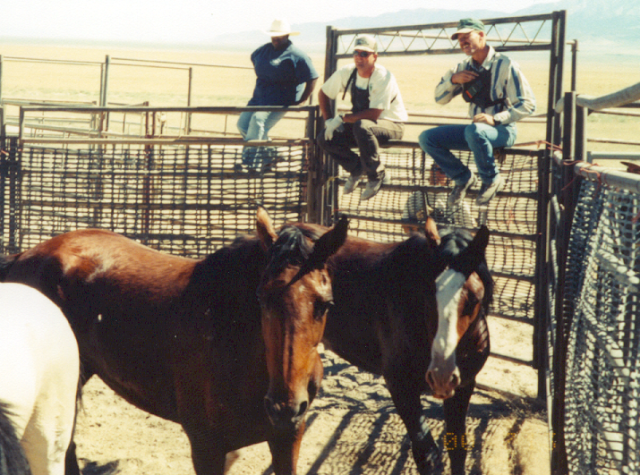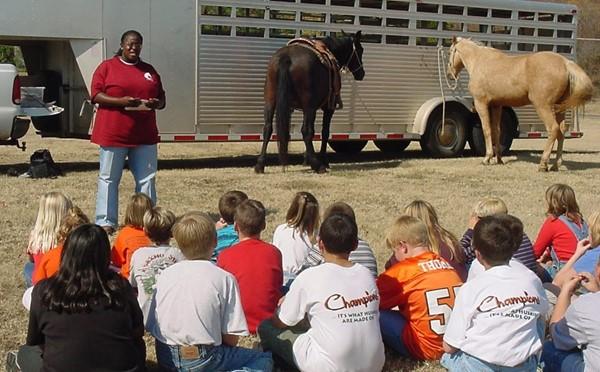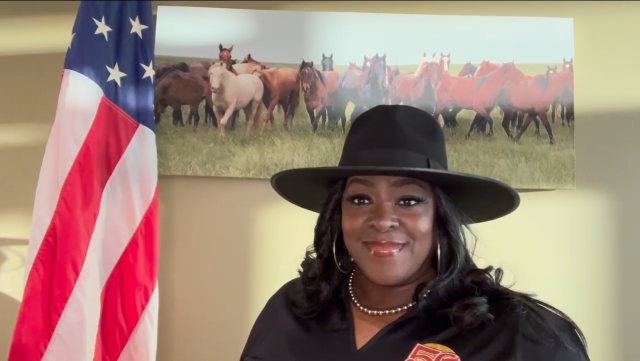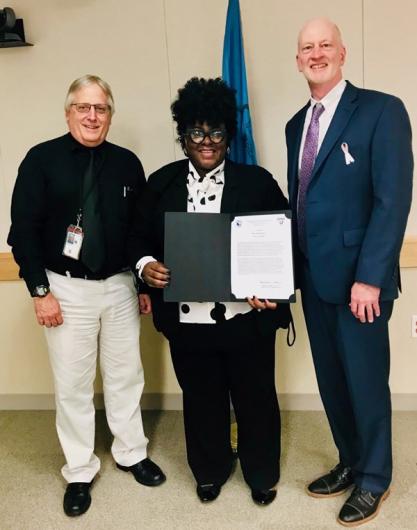You are viewing ARCHIVED content published online before January 20, 2025. Please note that this content is NOT UPDATED, and links may not work. Additionally, any previously issued diversity, equity, inclusion or gender-related guidance on this webpage should be considered rescinded. For current information, visit https://www.blm.gov/blog.
Holle' Waddell: A woman of action, a woman of thought
By Special Contributor Paula Cook
Holle' Waddell has recently accepted the permanent position of Wild Horse and Burro Program Division Chief. Tales of the Trails Special Contributor Paula Cook recently caught up with Waddell to learn more about her, and what led her to this important role.
“Think out your plan like a woman of action then act out your plan like a woman of thought.”
- Debora Hooks-Maxwell, Mother of Holle’ Waddell
One can say without exaggeration that Holle’ Waddell has spent her entire career working for the well-being of the tens of thousands of wild horses and burros that are managed by the Bureau of Land Management (BLM). Her experience in the Wild Horse and Burro Program is as diverse as it is encompassing. From camping out for 17 straight days in a dusty Utah desert to representing the Wild Horse and Burro Program at legislative budget meetings in Washington D.C., you might even say that Waddell has participated in pretty much every facet of the complicated management system that balances the health and safety of the wild horses and burros with the other mandated land uses the BLM is tasked with overseeing.

At first glance, a city girl from Oklahoma may seem a strange fit for a role charged with managing wild horses and burros spread across nearly 27 million acres of rangelands in 10 Western states, but it doesn’t take a very long conversation with Ms. Waddell to understand the many reasons she is a natural for the job.
In her early years, the Oklahoma City native spent school vacations in the tiny nearby hamlet of Jones, where her uncles lived and had farm ground. Her time spent there amongst hogs, chickens, goats and other farm animals convinced the young girl that her future was as a large animal veterinarian.
Raised in a family that valued education, Waddell’s mother attended the University of Central Oklahoma and was a mental health therapist/crisis counselor who was instrumental in the growth of the state’s first mental health hotline. Her aunt holds a master’s degree from the University of Kansas. These strong female role-models influenced Waddell greatly, and when it came time for her to choose a college she settled on Langston University in nearby Langston, Oklahoma. The only Historically Black College or University in Oklahoma, Langston was established as the state’s second land grant university in 1897. Originally named the Colored Agricultural and Normal University, Langston was founded after a group of black citizens lobbied the Oklahoma Industrial School and College Commission for a college that would admit African Americans.
Langston’s long history of promoting education and equity for people of color was a perfect fit for the civic-minded Waddell, whose community-oriented mother had taught by example the importance of embracing one’s culture and heritage. Waddell excelled at Langston, pursuing double Bachelor of Science Degrees in Animal Science and Biology.
During her junior year of college Waddell’s plans changed when she decided she did not want to keep going to school after finishing her undergraduate degrees; she was ready to apply her education to real-world opportunities. With several available options, including internships with the Corps of Engineers, the Natural Resources Conservation Program, and the BLM Student Career Experience Program (SCEP), Waddell chose the SCEP opportunity, and immersed herself as a Wild Horse and Burro Specialist based out of the BLM’s Oklahoma Field Office.
It is said that there are defining moments that shape the course of one’s life forever. It was during her senior year at Langston, when Waddell was working in the Wild Horse and Burro Program after completion of her SCEP internship, that she had an experience which cemented her lifelong dedication to the pursuit of social justice and racial equality. Upon reporting to her desk one morning Waddell was stunned to see a rope tied into the form of a noose sitting on the edge of her counter. She was understandably shaken by the discovery, and immediately called her mother, saying “Mom, what do I do?” Her mother’s advice was immediate and straightforward. “Holle’, you can either quit and go find a job where you fit in, or you can use this as an opportunity to open doors for other people.” Waddell made her choice, tossed the rope into her trash can and went to work. She says now that the jarring episode taught her what would become hallmarks of her career – you have to have grit and you can’t take things personally.
Waddell threw herself into her job with a passion born of the love of learning and a desire to make a difference. She worked at wild horse and burro adoptions, sometimes traveling many long hours in a BLM pickup truck to get to an adoption site. She worked in heat and in cold and learned to drive t-posts and string jute fencing at gathers. When she was called upon to attend a state budget meeting because her supervisor was ill, the answer was yes, no matter the fact that she had little to no budgeting experience and had never sat in a meeting of that type before. Told before she left that she needed to obtain a certain budget level to fund critical operations in the Wild Horse and Burro Program, Waddell stuck it out, not giving in until she got the funds. She accepted a position as the Wild Horse and Burro Program Budget Lead though it meant uprooting her young family and moving to Washington, D.C. Whatever it took to advance the cause of effective rangeland management, Holle’ Waddell was there.

Along the way she learned about herself, and further defined the type of leader and community citizen she wanted to be. When a supervisor refused to give her a ‘5’ rating (the highest possible mark) on her employee review, Waddell asked why. The reply was that although she was an excellent employee and had exceeded all her goals, giving her a ‘5’ would leave her nothing to strive for. In that moment she vowed to always recognize and reward employees’ effort and accomplishments as soon as she possibly could. When her personal cell phone number was released to the public by a wild horse activist, Waddell received a call from an uninformed and caustic critic of the Wild Horse and Burro Program. The caller berated the agency and Waddell personally, ending the rant with saying she had googled Waddell and finally calling her a racial slur. Unphased, Waddell calmly suggested to the woman that instead of googling her she should instead google BLM.gov and find out some facts.
Always keeping in mind her mother’s admonishment to open doors for other people, Waddell champions equal opportunity in both her workplace and her community. The values she learned at home and nurtured while attending Langston University blossomed as she took on management duties, and she is an unfailing advocate for diversity. Her recruiting efforts have demonstrated time and again that the skills required to be successful in the Wild Horse and Burro Program can be learned whether a qualified candidate comes from a Texas ranching background or was raised in the inner city.
The lasting impact Waddell has on those around her is testimony to her efficacy. She was once stopped at an event by a former inmate she had met while inspecting horses at an Oklahoma prison training facility years before. He wanted to tell her that her encouragement had inspired him to better himself, and thanks chiefly to her, he became a professional horse trainer when he completed his sentence.

Waddell has contributed to countless causes in her local community. Whether expanding her church Community Outreach program, starting a dance school founded on the beliefs that dance education and performance should be available to everyone and that through dance, one will gain not only a beautiful tool for self-expression, but also a tool for self-discipline and self-esteem, initiating various efforts to ensure the community had access to the arts, or spearheading the coordination of arts festivals focused on diverse communities including oNE OKC to support Northeast Oklahoma City Renaissance, she devotes her time, effort, and skills to furthering the ideals of economic and social parity.
Waddell’s contributions to the Wild Horse and Burro Program are as legion as those she has made to her community. She worked hands-on with wild horses and burros as a Wild Horse and Burro Specialist for many years, and in 2008 accepted a position as the Wild Horse and Burro Program Budget Lead. From 2014 to just recently, Waddell served as Branch Chief for the BLM Wild Horse and Burro Program, Off-Range Operations. In this position she spearheaded initiatives on youth hires, strategic workforce planning, recruitment, position classification and performance management. She developed standard operating procedures that have been adopted throughout the Bureau. With her strong knowledge of the federal budgeting process and accrual accounting systems, Waddell has been responsible for multi-funding sources and budget levels ranging from $40 million to $80 million. She was instrumental in the BLM’s launch of the Wild Horse and Burro Adoption Incentive Program, which provides up to $1,000 to individuals who adopt an untrained wild horse or burro from the BLM, a program that has dramatically increased the adoption rates of wild horses and burros. Waddell has been honored for her outstanding contributions to the Wild Horse and Burro Program with a Department of Interior Superior Service Award in a ceremony held in Washington, D.C.

In her 20+ years of service to the BLM and the Wild Horse and Burro Program it manages, Waddell has coordinated and collaborated with Wild Horse and Burro personnel and leadership at every different level, as well as successfully managing relationships with external stakeholders and the American public. Her breadth of experience and dedication to providing a level playing field in both her work and community makes her uniquely qualified to continue the quest for balancing rangeland management with the needs of the wild horses and burros who live there.
Related Content
Related Stories
- New year, new beginnings for dozens of wild horses and burros in Arizona
- Applying for BLM Special Recreation Permits just got easier
- From Range to Ring: Wild Horses begin their journey to Branded Bonanza
- BLM unveils redesigned NEPA Register for easier public access
- BLM recognizes 2025 Community Engagement Award winners
